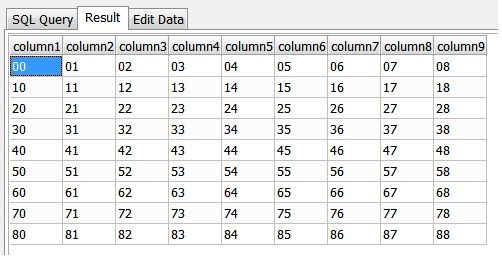- Python读取.parquet文件
Henrietta's NOTES
pythonpandas
提示:在MacOS和Jupyternotebook环境下的用法Device:MacOSPython:3.10.9Pandas:1.5.3Jupyternotebook问题描述直接用pandas中pd.read_parquet()即可,但是这个方法在和read_csv一样用之前需要先安装fastparquet活着pyarrow,方法如下:打开MacOS的终端,输入:pipinstallfastpar
- 【华为OD机试真题 2025B卷】153、端口合并 | 机试真题+思路参考+代码解析(C++、Java、Py、C语言、JS)
KFickle
最新华为OD机试(C++JavaPyCJS)+OJ华为odc++java华为OD机试真题javascript端口合并
文章目录一、题目题目描述输入输出样例1样例2样例3二、代码与思路参考C++代码Java代码Python代码C语言代码JS代码订阅本专栏后即可解锁在线OJ刷题权限个人博客首页:KFickle专栏介绍:最新的华为OD机试真题,使用C++,Java,Python,C语言,JS五种语言进行解答,每个题目都包含解题思路,五种语言的解法,每日持续更新中,订阅后支持开通在线OJ测试刷题!!!一次订阅永久享受更新
- 【华为OD机试真题 2025B卷】154、快递业务站 | 机试真题+思路参考+代码解析(C++、Java、Py、C语言、JS)
KFickle
最新华为OD机试(C++JavaPyCJS)+OJ华为odc++java华为OD机试真题快递业务站javascriptc语言
文章目录一、题目题目描述输入输出样例1样例2二、代码与思路参考C++代码Java代码Python代码C语言代码JS代码订阅本专栏后即可解锁在线OJ刷题权限个人博客首页:KFickle专栏介绍:最新的华为OD机试真题,使用C++,Java,Python,C语言,JS五种语言进行解答,每个题目都包含解题思路,五种语言的解法,每日持续更新中,订阅后支持开通在线OJ测试刷题!!!一次订阅永久享受更新,有代
- 【华为OD机试真题 2025B卷】152、积木最远距离 | 机试真题+思路参考+代码解析(C++、Java、Py、C语言、JS)
KFickle
最新华为OD机试(C++JavaPyCJS)+OJ华为odc++java华为OD机试真题积木最远距离javascriptc语言
文章目录一、题目题目描述输入输出样例1样例2二、代码与思路参考C++代码Java代码Python代码C语言代码JS代码订阅本专栏后即可解锁在线OJ刷题权限个人博客首页:KFickle专栏介绍:最新的华为OD机试真题,使用C++,Java,Python,C语言,JS五种语言进行解答,每个题目都包含解题思路,五种语言的解法,每日持续更新中,订阅后支持开通在线OJ测试刷题!!!一次订阅永久享受更新,有代
- 【华为OD机试真题 2025B卷】150、对称美学 | 机试真题+思路参考+代码解析(C++、Java、Py、C语言、JS)
KFickle
最新华为OD机试(C++JavaPyCJS)+OJ华为odc++javajavascript华为OD机试真题对称美学
文章目录一、题目题目描述输入输出样例1样例2二、代码与思路参考C++代码Java代码Python代码C语言代码JS代码订阅本专栏后即可解锁在线OJ刷题权限个人博客首页:KFickle专栏介绍:最新的华为OD机试真题,使用C++,Java,Python,C语言,JS五种语言进行解答,每个题目都包含解题思路,五种语言的解法,每日持续更新中,订阅后支持开通在线OJ测试刷题!!!一次订阅永久享受更新,有代
- 【华为OD机试真题 2025B卷】149、区间交叠问题 | 机试真题+思路参考+代码解析(C++、Java、Py、C语言、JS)
KFickle
最新华为OD机试(C++JavaPyCJS)+OJ华为odc++java华为OD机试真题javascript最大平分数组
文章目录一、题目题目描述输入输出样例1样例2二、代码与思路参考C++代码Java代码Python代码C语言代码JS代码订阅本专栏后即可解锁在线OJ刷题权限个人博客首页:KFickle专栏介绍:最新的华为OD机试真题,使用C++,Java,Python,C语言,JS五种语言进行解答,每个题目都包含解题思路,五种语言的解法,每日持续更新中,订阅后支持开通在线OJ测试刷题!!!一次订阅永久享受更新,有代
- 【华为OD机试真题 2025B卷】147、连接器问题 | 机试真题+思路参考+代码解析(C++、Java、Py、C语言、JS)
KFickle
最新华为OD机试(C++JavaPyCJS)+OJ华为odc++java华为OD机试真题javascriptc语言连接器问题
文章目录一、题目题目描述输入输出样例1样例2二、代码与思路参考C++代码Java代码Python代码C语言代码JS代码订阅本专栏后即可解锁在线OJ刷题权限个人博客首页:KFickle专栏介绍:最新的华为OD机试真题,使用C++,Java,Python,C语言,JS五种语言进行解答,每个题目都包含解题思路,五种语言的解法,每日持续更新中,订阅后支持开通在线OJ测试刷题!!!一次订阅永久享受更新,有代
- 【华为OD机试真题 2025B卷】145、无向图染色 | 机试真题+思路参考+代码解析(C++、Java、Py、C语言、JS)
KFickle
最新华为OD机试(C++JavaPyCJS)+OJ华为odc++javac语言华为OD机试真题无向图染色
文章目录一、题目题目描述输入输出样例1样例2二、代码与思路参考C++代码Java代码Python代码C语言代码JS代码订阅本专栏后即可解锁在线OJ刷题权限个人博客首页:KFickle专栏介绍:最新的华为OD机试真题,使用C++,Java,Python,C语言,JS五种语言进行解答,每个题目都包含解题思路,五种语言的解法,每日持续更新中,订阅后支持开通在线OJ测试刷题!!!一次订阅永久享受更新,有代
- 【华为OD机试真题 2025B卷】140、不含101的数 | 机试真题+思路参考+代码解析(C++、Java、Py、C语言、JS)
KFickle
最新华为OD机试(C++JavaPyCJS)+OJ华为odc++java华为OD机试真题javascript不含101的数c语言
文章目录一、题目题目描述输入输出样例1样例2二、代码与思路参考C++代码Java代码Python代码C语言代码JS代码订阅本专栏后即可解锁在线OJ刷题权限个人博客首页:KFickle专栏介绍:最新的华为OD机试真题,使用C++,Java,Python,C语言,JS五种语言进行解答,每个题目都包含解题思路,五种语言的解法,每日持续更新中,订阅后支持开通在线OJ测试刷题!!!一次订阅永久享受更新,有代
- 【华为OD机试真题 2025B卷】135、采样过滤 | 机试真题+思路参考+代码解析(C++、Java、Py、C语言、JS)
KFickle
最新华为OD机试(C++JavaPyCJS)+OJ华为odc++java华为OD机试真题javascriptc语言采样过滤
文章目录一、题目题目描述输入输出样例1二、代码与思路参考C++代码Java代码Python代码C语言代码JS代码订阅本专栏后即可解锁在线OJ刷题权限个人博客首页:KFickle专栏介绍:最新的华为OD机试真题,使用C++,Java,Python,C语言,JS五种语言进行解答,每个题目都包含解题思路,五种语言的解法,每日持续更新中,订阅后支持开通在线OJ测试刷题!!!一次订阅永久享受更新,有代码问题
- 【华为OD机试真题 2025B卷】127、最长的非严格递增连续数字列的长度 | 机试真题+思路参考+代码解析(C++、Java、Py、C语言、JS)
KFickle
最新华为OD机试(C++JavaPyCJS)+OJ华为odc++java华为OD机试真题javascriptc语言
文章目录一、题目题目描述输入输出样例1样例2二、代码与思路参考C++代码Java代码Python代码C语言代码JS代码订阅本专栏后即可解锁在线OJ刷题权限个人博客首页:KFickle专栏介绍:最新的华为OD机试真题,使用C++,Java,Python,C语言,JS五种语言进行解答,每个题目都包含解题思路,五种语言的解法,每日持续更新中,订阅后支持开通在线OJ测试刷题!!!一次订阅永久享受更新,有代
- 【华为OD机试真题 2025B卷】125、表达式括号匹配 | 机试真题+思路参考+代码解析(C++、Java、Py、C语言、JS)
KFickle
最新华为OD机试(C++JavaPyCJS)+OJ华为odc++java华为OD机试真题javascriptc语言表达式括号匹配
文章目录一、题目题目描述输入输出样例1样例2样例3样例4二、代码与思路参考C++代码Java代码Python代码C语言代码JS代码订阅本专栏后即可解锁在线OJ刷题权限个人博客首页:KFickle专栏介绍:最新的华为OD机试真题,使用C++,Java,Python,C语言,JS五种语言进行解答,每个题目都包含解题思路,五种语言的解法,每日持续更新中,订阅后支持开通在线OJ测试刷题!!!一次订阅永久享
- 【华为OD机试真题 2025B卷】124、括号匹配 | 机试真题+思路参考+代码解析(C++、Java、Py、C语言、JS)
KFickle
最新华为OD机试(C++JavaPyCJS)+OJ华为odc++java华为OD机试真题括号匹配c语言javascript
文章目录一、题目题目描述输入输出样例1样例2样例3二、代码与思路参考C++代码Java代码Python代码C语言代码JS代码订阅本专栏后即可解锁在线OJ刷题权限个人博客首页:KFickle专栏介绍:最新的华为OD机试真题,使用C++,Java,Python,C语言,JS五种语言进行解答,每个题目都包含解题思路,五种语言的解法,每日持续更新中,订阅后支持开通在线OJ测试刷题!!!一次订阅永久享受更新
- 【华为OD机试真题 2025B卷】118、满足条件的最长子串的长度 I | 机试真题+思路参考+代码解析(C++、Java、Py、C语言、JS)
KFickle
最新华为OD机试(C++JavaPyCJS)+OJ华为odc++java华为OD机试真题满足条件的最长子串的长度I华为OD机试真题2025B卷
文章目录一、题目题目描述输入输出样例1样例2样例3样例4二、代码与思路参考C++代码Java代码Python代码C语言代码JS代码订阅本专栏后即可解锁在线OJ刷题权限个人博客首页:KFickle专栏介绍:最新的华为OD机试真题,使用C++,Java,Python,C语言,JS五种语言进行解答,每个题目都包含解题思路,五种语言的解法,每日持续更新中,订阅后支持开通在线OJ测试刷题!!!一次订阅永久享
- 【华为OD机试真题 2025B卷】116、货币单位换算 | 机试真题+思路参考+代码解析(C++、Java、Py、C语言、JS)
KFickle
最新华为OD机试(C++JavaPyCJS)+OJ华为odc++java华为OD机试真题货币单位换算华为OD机试真题2025B卷javascript
文章目录一、题目题目描述输入输出样例1样例2样例3样例4二、代码与思路参考C++代码Java代码Python代码C语言代码JS代码订阅本专栏后即可解锁在线OJ刷题权限个人博客首页:KFickle专栏介绍:最新的华为OD机试真题,使用C++,Java,Python,C语言,JS五种语言进行解答,每个题目都包含解题思路,五种语言的解法,每日持续更新中,订阅后支持开通在线OJ测试刷题!!!一次订阅永久享
- 【华为OD机试真题 2025A卷】111、 查找单入口空闲区域 | 机试真题+思路参考+代码解析(C++、Java、Py、C语言、JS)
KFickle
最新华为OD机试(C++JavaPyCJS)+OJ华为od华为OD机试真题2025A卷华为od机试2025A卷查找单入口空闲区域c++c语言java
文章目录一、题目题目描述输入输出样例1样例2样例3样例4二、代码与思路参考C++代码Java代码Python代码C语言代码JS代码订阅本专栏后即可解锁在线OJ刷题权限个人博客首页:KFickle专栏介绍:最新的华为OD机试真题,使用C++,Java,Python,C语言,JS五种语言进行解答,每个题目都包含解题思路,五种语言的解法,每日持续更新中,订阅后支持开通在线OJ测试刷题!!!一次订阅永久享
- 【华为OD机试真题 Python语言】134、挑选字符串 | 机试真题+思路参考+代码解析
KFickle
华为odpython华为华为OD机试真题挑选字符串
文章目录一、题目题目描述输入输出样例1样例2样例3二、思路参考三、代码参考作者:鲨鱼狼臧个人博客首页:鲨鱼狼臧专栏介绍:2024华为OD机试真题,使用Python进行解答,专栏每篇文章都包括真题,思路参考,代码分析,思路参考超过百字,欢迎大家订阅学习一、题目题目描述给定a-z,26个英文字母小写字符串组成的字符串A和B,其中A可能存在重复字母,B不会存在重复字母,现从字符串A中按规则挑选一些字母可
- 【华为OD机试真题 Python语言】135、采样过滤 | 机试真题+思路参考+代码解析
KFickle
华为odpython华为华为OD机试真题采样过滤
文章目录一、题目题目描述输入输出样例1二、思路参考三、代码参考作者:鲨鱼狼臧个人博客首页:鲨鱼狼臧专栏介绍:2024华为OD机试真题,使用Python进行解答,专栏每篇文章都包括真题,思路参考,代码分析,思路参考超过百字,欢迎大家订阅学习一、题目题目描述在做物理实验时,为了计算物体移动的速率,通过相机等工具周期性的采样物体移动距离。由于工具故障,采样数据存在误差甚至相误的情况。需要通过一个算法过滤
- 【华为OD机试真题 Python语言】132、任务调度 | 机试真题+思路参考+代码解析
KFickle
华为odpython华为华为OD机试真题任务调度
文章目录一、题目题目描述输入输出样例1二、思路参考三、代码参考作者:鲨鱼狼臧个人博客首页:鲨鱼狼臧专栏介绍:2024华为OD机试真题,使用Python进行解答,专栏每篇文章都包括真题,思路参考,代码分析,思路参考超过百字,欢迎大家订阅学习一、题目题目描述现有一个CPU和一些任务需要处理,已提前获知每个任务的任务ID、优先级、所需执行时间和到达时间。CPU同时只能运行一个任务,请编写一个[任务调度]
- python 爬取preview的信息
YHFJerry
python开发语言
Python,HTTP相关视频讲解:python的or运算赋值用法用python编程Excel有没有用处?011_编程到底好玩在哪?查看python文件_输出py文件_cat_运行python文件_shelPython爬取Preview的信息在当今互联网时代,信息的获取变得异常方便,爬虫技术成为了一种非常重要的手段。Python作为一门强大的编程语言,被广泛用于网络爬虫的开发。本文将介绍如何使用P
- Python Pandas 实践学习笔记(1)
PythonPandas教程Pandas是一个开源的、BSD许可证的Python库,为Python编程语言提供高性能、易于使用的数据结构和数据分析工具。Python与Pandas在学术和商业领域都被广泛应用,包括金融、经济、统计学、分析等领域。在本教程中,我们将学习PythonPandas的各种特性以及如何在实践中使用它们。教程对象本教程适用于那些想要学习Pandas基础知识和各种函数的人。对于从
- 华为OD机试2025B卷真题题库目录|机考题库 + 算法考点详解(Python/JS/C/C++)
专栏导读本专栏收录于《华为OD机试真题(Python/JS/C/C++)》。刷的越多,抽中的概率越大,私信哪吒,备注华为OD,加入华为OD刷题交流群,每一题都有详细的答题思路、详细的代码注释、3个测试用例、为什么这道题采用XX算法、XX算法的适用场景,发现新题目,随时更新。2025年5月12日,华为官方已经将华为OD机试(A卷)切换为B卷。目前正在考的是B卷,按照华为OD往常的操作,B卷题目是由往
- Python Preview 项目教程
PythonPreview项目教程1.项目的目录结构及介绍python-preview/├──images/├──.eslintrc.json├──.gitignore├──.vscodeignore├──CHANGELOG.md├──README.md├──package.json├──tsconfig.json└──webpack.config.jsimages/:存放项目相关的图片文件。.e
- Python Preview 插件使用教程
汤涌双
PythonPreview插件使用教程1.项目介绍PythonPreview是一个适用于VisualStudioCode(VSCode)的扩展插件,旨在为Python代码提供调试预览支持。该插件允许用户在编辑器中直接预览Python代码的执行结果,从而提高开发效率和代码可读性。PythonPreview插件由dongli开发,当前版本为0.0.4。2.项目快速启动安装步骤打开VSCode。进入扩展
- 基于Python+Vue的个性化教学可视化系统设计与实现django
源码哆哆*V+ymhydo
毕设pythonvue.jsdjango
文章目录前言系统实现效果前台用户功能模块后台管理功能模块Python技术介绍Django框架介绍预期达到的目标设计思路详细视频演示技术路线解决的思路性能/安全/负载方面可行性分析论证为什么选择我们
- 【python+SQLAlchemy】
ryanling河
python数据库sql
需要先安装pymysql模块,以便能够在SQLAlchemy中使用MySQL数据库。使用以下命令进行安装:pipinstallSQLAlchemypipinstallpymysql目前SQLAlchemy版本是2.0.0以上了以下是基本写法以便快速学习fromsqlalchemyimportcreate_engine,Column,Integer,Stringfromsqlalchemy.ormi
- python sqlalchemy连接oracle_Python SQLalchemy 基础操作之数据库增删改查
weixin_39970994
python
ORM全称ObjectRelationalMapping,即对象关系映射。简单的说,ORM将数据库中的表与面向对象语言中的类建立了一种对应关系。这样,我们要操作数据库,数据库中的表或者表中的一条记录就可以直接通过操作类或者类实例来完成。SQLAlchemy是Python社区最知名的ORM工具之一,为高效和高性能的数据库访问设计,实现了完整的企业级持久模型。SQLAlchemy优点:简洁易读:将数据
- Uniapp微信小程序开发:后端服务器搭建指南(语言选择+部署方案)
目录前言:Uniapp+微信小程序的架构模式️后端服务器的作用后端语言选择(Node.js/Java/Python/PHP/Go)☁️服务器部署方案(云服务器vsServerless)实战:如何连接Uniapp与后端API安全优化:HTTPS、JWT、接口鉴权数据库选择(MySQL、MongoDB、云数据库)总结&最佳实践1.前言:Uniapp+微信小程序的架构模式Uniapp是一个基于Vue.j
- 华为OD机试 2025 B卷 - 最大括号深度 (C++ & Python & JAVA & JS & GO)
无限码力
华为OD机试真题刷题笔记华为od华为OD机试华为OD机试2025B卷华为OD2025B卷华为机试2025B卷
最大括号深度华为OD机试真题目录点击查看:华为OD机试2025B卷真题题库目录|机考题库+算法考点详解华为OD机试2025B卷100分题型题目描述现有一字符串仅由‘(‘,’)’,’{‘,’}’,’[‘,’]’六种括号组成。若字符串满足以下条件之一,则为无效字符串:任一类型的左右括号数量不相等;存在未按正确顺序(先左后右)闭合的括号。输出括号的最大嵌套深度,若字符串无效则输出0。0≤字符串长度≤10
- Python Matplotlib中的fontdict参数说明
@MMiL
PyBuildpythonmatplotlibpandasnumpy
文章目录1fontdict参数的常用属性1.1使用示例1.2其他注意事项1.3结合其他参数各位老板好,在Python的Matplotlib库中,fontdict参数用于定义文本属性的字典。这些属性包括字体大小、颜色、样式等,主要用于控制标题、标签和其他文本元素的显示效果。通过将fontdict传递给相关函数(如plt.title、plt.xlabel等),可以自定义文本的外观。1fontdict参
- Hadoop(一)
朱辉辉33
hadooplinux
今天在诺基亚第一天开始培训大数据,因为之前没接触过Linux,所以这次一起学了,任务量还是蛮大的。
首先下载安装了Xshell软件,然后公司给了账号密码连接上了河南郑州那边的服务器,接下来开始按照给的资料学习,全英文的,头也不讲解,说锻炼我们的学习能力,然后就开始跌跌撞撞的自学。这里写部分已经运行成功的代码吧.
在hdfs下,运行hadoop fs -mkdir /u
- maven An error occurred while filtering resources
blackproof
maven报错
转:http://stackoverflow.com/questions/18145774/eclipse-an-error-occurred-while-filtering-resources
maven报错:
maven An error occurred while filtering resources
Maven -> Update Proje
- jdk常用故障排查命令
daysinsun
jvm
linux下常见定位命令:
1、jps 输出Java进程
-q 只输出进程ID的名称,省略主类的名称;
-m 输出进程启动时传递给main函数的参数;
&nb
- java 位移运算与乘法运算
周凡杨
java位移运算乘法
对于 JAVA 编程中,适当的采用位移运算,会减少代码的运行时间,提高项目的运行效率。这个可以从一道面试题说起:
问题:
用最有效率的方法算出2 乘以8 等於几?”
答案:2 << 3
由此就引发了我的思考,为什么位移运算会比乘法运算更快呢?其实简单的想想,计算机的内存是用由 0 和 1 组成的二
- java中的枚举(enmu)
g21121
java
从jdk1.5开始,java增加了enum(枚举)这个类型,但是大家在平时运用中还是比较少用到枚举的,而且很多人和我一样对枚举一知半解,下面就跟大家一起学习下enmu枚举。先看一个最简单的枚举类型,一个返回类型的枚举:
public enum ResultType {
/**
* 成功
*/
SUCCESS,
/**
* 失败
*/
FAIL,
- MQ初级学习
510888780
activemq
1.下载ActiveMQ
去官方网站下载:http://activemq.apache.org/
2.运行ActiveMQ
解压缩apache-activemq-5.9.0-bin.zip到C盘,然后双击apache-activemq-5.9.0-\bin\activemq-admin.bat运行ActiveMQ程序。
启动ActiveMQ以后,登陆:http://localhos
- Spring_Transactional_Propagation
布衣凌宇
springtransactional
//事务传播属性
@Transactional(propagation=Propagation.REQUIRED)//如果有事务,那么加入事务,没有的话新创建一个
@Transactional(propagation=Propagation.NOT_SUPPORTED)//这个方法不开启事务
@Transactional(propagation=Propagation.REQUIREDS_N
- 我的spring学习笔记12-idref与ref的区别
aijuans
spring
idref用来将容器内其他bean的id传给<constructor-arg>/<property>元素,同时提供错误验证功能。例如:
<bean id ="theTargetBean" class="..." />
<bean id ="theClientBean" class=&quo
- Jqplot之折线图
antlove
jsjqueryWebtimeseriesjqplot
timeseriesChart.html
<script type="text/javascript" src="jslib/jquery.min.js"></script>
<script type="text/javascript" src="jslib/excanvas.min.js&
- JDBC中事务处理应用
百合不是茶
javaJDBC编程事务控制语句
解释事务的概念; 事务控制是sql语句中的核心之一;事务控制的作用就是保证数据的正常执行与异常之后可以恢复
事务常用命令:
Commit提交
- [转]ConcurrentHashMap Collections.synchronizedMap和Hashtable讨论
bijian1013
java多线程线程安全HashMap
在Java类库中出现的第一个关联的集合类是Hashtable,它是JDK1.0的一部分。 Hashtable提供了一种易于使用的、线程安全的、关联的map功能,这当然也是方便的。然而,线程安全性是凭代价换来的――Hashtable的所有方法都是同步的。此时,无竞争的同步会导致可观的性能代价。Hashtable的后继者HashMap是作为JDK1.2中的集合框架的一部分出现的,它通过提供一个不同步的
- ng-if与ng-show、ng-hide指令的区别和注意事项
bijian1013
JavaScriptAngularJS
angularJS中的ng-show、ng-hide、ng-if指令都可以用来控制dom元素的显示或隐藏。ng-show和ng-hide根据所给表达式的值来显示或隐藏HTML元素。当赋值给ng-show指令的值为false时元素会被隐藏,值为true时元素会显示。ng-hide功能类似,使用方式相反。元素的显示或
- 【持久化框架MyBatis3七】MyBatis3定义typeHandler
bit1129
TypeHandler
什么是typeHandler?
typeHandler用于将某个类型的数据映射到表的某一列上,以完成MyBatis列跟某个属性的映射
内置typeHandler
MyBatis内置了很多typeHandler,这写typeHandler通过org.apache.ibatis.type.TypeHandlerRegistry进行注册,比如对于日期型数据的typeHandler,
- 上传下载文件rz,sz命令
bitcarter
linux命令rz
刚开始使用rz上传和sz下载命令:
因为我们是通过secureCRT终端工具进行使用的所以会有上传下载这样的需求:
我遇到的问题:
sz下载A文件10M左右,没有问题
但是将这个文件A再传到另一天服务器上时就出现传不上去,甚至出现乱码,死掉现象,具体问题
解决方法:
上传命令改为;rz -ybe
下载命令改为:sz -be filename
如果还是有问题:
那就是文
- 通过ngx-lua来统计nginx上的虚拟主机性能数据
ronin47
ngx-lua 统计 解禁ip
介绍
以前我们为nginx做统计,都是通过对日志的分析来完成.比较麻烦,现在基于ngx_lua插件,开发了实时统计站点状态的脚本,解放生产力.项目主页: https://github.com/skyeydemon/ngx-lua-stats 功能
支持分不同虚拟主机统计, 同一个虚拟主机下可以分不同的location统计.
可以统计与query-times request-time
- java-68-把数组排成最小的数。一个正整数数组,将它们连接起来排成一个数,输出能排出的所有数字中最小的。例如输入数组{32, 321},则输出32132
bylijinnan
java
import java.util.Arrays;
import java.util.Comparator;
public class MinNumFromIntArray {
/**
* Q68输入一个正整数数组,将它们连接起来排成一个数,输出能排出的所有数字中最小的一个。
* 例如输入数组{32, 321},则输出这两个能排成的最小数字32132。请给出解决问题
- Oracle基本操作
ccii
Oracle SQL总结Oracle SQL语法Oracle基本操作Oracle SQL
一、表操作
1. 常用数据类型
NUMBER(p,s):可变长度的数字。p表示整数加小数的最大位数,s为最大小数位数。支持最大精度为38位
NVARCHAR2(size):变长字符串,最大长度为4000字节(以字符数为单位)
VARCHAR2(size):变长字符串,最大长度为4000字节(以字节数为单位)
CHAR(size):定长字符串,最大长度为2000字节,最小为1字节,默认
- [强人工智能]实现强人工智能的路线图
comsci
人工智能
1:创建一个用于记录拓扑网络连接的矩阵数据表
2:自动构造或者人工复制一个包含10万个连接(1000*1000)的流程图
3:将这个流程图导入到矩阵数据表中
4:在矩阵的每个有意义的节点中嵌入一段简单的
- 给Tomcat,Apache配置gzip压缩(HTTP压缩)功能
cwqcwqmax9
apache
背景:
HTTP 压缩可以大大提高浏览网站的速度,它的原理是,在客户端请求网页后,从服务器端将网页文件压缩,再下载到客户端,由客户端的浏览器负责解压缩并浏览。相对于普通的浏览过程HTML ,CSS,Javascript , Text ,它可以节省40%左右的流量。更为重要的是,它可以对动态生成的,包括CGI、PHP , JSP , ASP , Servlet,SHTML等输出的网页也能进行压缩,
- SpringMVC and Struts2
dashuaifu
struts2springMVC
SpringMVC VS Struts2
1:
spring3开发效率高于struts
2:
spring3 mvc可以认为已经100%零配置
3:
struts2是类级别的拦截, 一个类对应一个request上下文,
springmvc是方法级别的拦截,一个方法对应一个request上下文,而方法同时又跟一个url对应
所以说从架构本身上 spring3 mvc就容易实现r
- windows常用命令行命令
dcj3sjt126com
windowscmdcommand
在windows系统中,点击开始-运行,可以直接输入命令行,快速打开一些原本需要多次点击图标才能打开的界面,如常用的输入cmd打开dos命令行,输入taskmgr打开任务管理器。此处列出了网上搜集到的一些常用命令。winver 检查windows版本 wmimgmt.msc 打开windows管理体系结构(wmi) wupdmgr windows更新程序 wscrip
- 再看知名应用背后的第三方开源项目
dcj3sjt126com
ios
知名应用程序的设计和技术一直都是开发者需要学习的,同样这些应用所使用的开源框架也是不可忽视的一部分。此前《
iOS第三方开源库的吐槽和备忘》中作者ibireme列举了国内多款知名应用所使用的开源框架,并对其中一些框架进行了分析,同样国外开发者
@iOSCowboy也在博客中给我们列出了国外多款知名应用使用的开源框架。另外txx's blog中详细介绍了
Facebook Paper使用的第三
- Objective-c单例模式的正确写法
jsntghf
单例iosiPhone
一般情况下,可能我们写的单例模式是这样的:
#import <Foundation/Foundation.h>
@interface Downloader : NSObject
+ (instancetype)sharedDownloader;
@end
#import "Downloader.h"
@implementation
- jquery easyui datagrid 加载成功,选中某一行
hae
jqueryeasyuidatagrid数据加载
1.首先你需要设置datagrid的onLoadSuccess
$(
'#dg'
).datagrid({onLoadSuccess :
function
(data){
$(
'#dg'
).datagrid(
'selectRow'
,3);
}});
2.onL
- jQuery用户数字打分评价效果
ini
JavaScripthtmljqueryWebcss
效果体验:http://hovertree.com/texiao/jquery/5.htmHTML文件代码:
<!DOCTYPE html>
<html xmlns="http://www.w3.org/1999/xhtml">
<head>
<title>jQuery用户数字打分评分代码 - HoverTree</
- mybatis的paramType
kerryg
DAOsql
MyBatis传多个参数:
1、采用#{0},#{1}获得参数:
Dao层函数方法:
public User selectUser(String name,String area);
对应的Mapper.xml
<select id="selectUser" result
- centos 7安装mysql5.5
MrLee23
centos
首先centos7 已经不支持mysql,因为收费了你懂得,所以内部集成了mariadb,而安装mysql的话会和mariadb的文件冲突,所以需要先卸载掉mariadb,以下为卸载mariadb,安装mysql的步骤。
#列出所有被安装的rpm package rpm -qa | grep mariadb
#卸载
rpm -e mariadb-libs-5.
- 利用thrift来实现消息群发
qifeifei
thrift
Thrift项目一般用来做内部项目接偶用的,还有能跨不同语言的功能,非常方便,一般前端系统和后台server线上都是3个节点,然后前端通过获取client来访问后台server,那么如果是多太server,就是有一个负载均衡的方法,然后最后访问其中一个节点。那么换个思路,能不能发送给所有节点的server呢,如果能就
- 实现一个sizeof获取Java对象大小
teasp
javaHotSpot内存对象大小sizeof
由于Java的设计者不想让程序员管理和了解内存的使用,我们想要知道一个对象在内存中的大小变得比较困难了。本文提供了可以获取对象的大小的方法,但是由于各个虚拟机在内存使用上可能存在不同,因此该方法不能在各虚拟机上都适用,而是仅在hotspot 32位虚拟机上,或者其它内存管理方式与hotspot 32位虚拟机相同的虚拟机上 适用。
- SVN错误及处理
xiangqian0505
SVN提交文件时服务器强行关闭
在SVN服务控制台打开资源库“SVN无法读取current” ---摘自网络 写道 SVN无法读取current修复方法 Can't read file : End of file found
文件:repository/db/txn_current、repository/db/current
其中current记录当前最新版本号,txn_current记录版本库中版本
